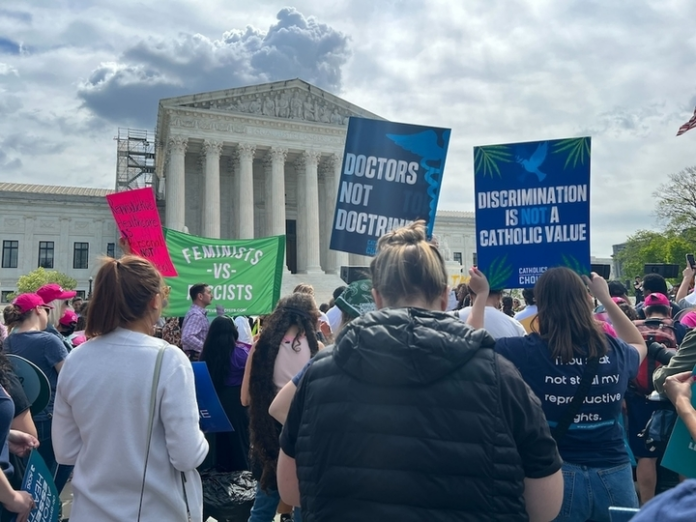
(States Newsroom) — A document inadvertently uploaded to the U.S. Supreme Court’s website on Wednesday appears to indicate the court will send a case regarding emergency abortion care in Idaho back to the Ninth Circuit Court of Appeals rather than make a decision, according to reporting from Bloomberg Law.
Rather than rule on the merits, the unofficial opinion, as cited by Bloomberg, essentially says the court took the case too soon in the process. The court acknowledged the document was accidentally uploaded for a short period of time on Wednesday, and told Bloomberg an official opinion will be released “in due course.”
According to the unofficial opinion, the decision is 6-3, with Justices Samuel Alito, Neil Gorsuch and Clarence Thomas dissenting.
The opinion, if it holds true, would reinstate the lower court’s injunction that blocked enforcement of the law as it relates to Idaho’s emergency room physicians who might need to perform an abortion when a pregnant patient is at risk of potentially serious health problems. The U.S. Justice Department sued Idaho over its near-total abortion ban in 2022 and said prosecuting physicians under those circumstances would violate the federal Emergency Medical Treatment and Labor Act, or EMTALA, which requires Medicare-funded hospitals to treat patients who come to an emergency room regardless of their ability to pay.
The Ninth Circuit Court of Appeals had scheduled an “en banc” hearing for the case in January, but after attorneys for the state of Idaho and religious conservative law firm Alliance Defending Freedom asked the Supreme Court to hear the case, the Ninth Circuit hearing was vacated and so was the injunction.
Without the injunction, ER doctors are subject to the full extent of Idaho’s abortion ban, which carries penalties of jail time, fines and the loss of a medical license. Those doctors are also subject to Idaho’s civil law that allows immediate and extended family members to sue for up to $20,000 over an abortion procedure.
Idaho’s ban contains only an exception to save the pregnant patient’s life, not to prevent detrimental health outcomes, including the loss of future fertility, which is a risk with severe infection or bleeding. Without further clarity written into the law, doctors in Idaho have said they can’t confidently assess when to safely intervene to save someone’s life and avoid losing their medical license or face between two and five years in prison. Rather than gamble with someone’s life, States Newsroom reported high-risk obstetric specialists have airlifted patients to facilities out of state that can freely perform the procedure before it’s too late. In 2023, such transfers happened once, but occurred six times between January and April, according to the chief medical officer of one of Idaho’s largest health systems.
Those transfers were cited by Justices Elena Kagan and Ketanji Brown Jackson as reasons for their decision to send the case back to the Ninth Circuit.
“As a practical matter, this Court’s intervention meant that Idaho physicians were forced to step back and watch as their patients suffered, or arrange for their patients to be airlifted out of ldaho,” Brown Jackson wrote in the unofficial opinion.
At a scheduled event in Boise, Idaho, on Wednesday, U.S. Health and Human Services Secretary Xavier Becerra said it was important to wait and not speculate about the opinion until it was official. But if true, Becerra said it affirmed the government’s position that anyone in America who is at risk of health problems or death should be able to seek care in an emergency room.
“Whether the care that a professional says you need to stabilize your health or to save your life is an abortion or not, the bottom line is none of us wants to be denied access to an emergency room when we need it,” Becerra said. “And (it’s) why I continue to say when Roe v. Wade was struck down, it impacted more than just abortion care — it impacted access to care, period.”
Dr. Loren Colson, a family physician in Idaho, said at the event that if the opinion holds true, it is only a small comfort to doctors in the state.
“This teeny tiny little carveout allows us as physicians in very specific scenarios to provide the care and hopefully not Life Flight people out of the state so they can go somewhere else to get the care that we can easily provide here, but it does not fix our problem here,” Colson said. “We still have a huge problem when it comes to being able to access abortion.”
The court is scheduled to release more opinions Thursday and Friday morning, and the official ruling could come on either of those days.






